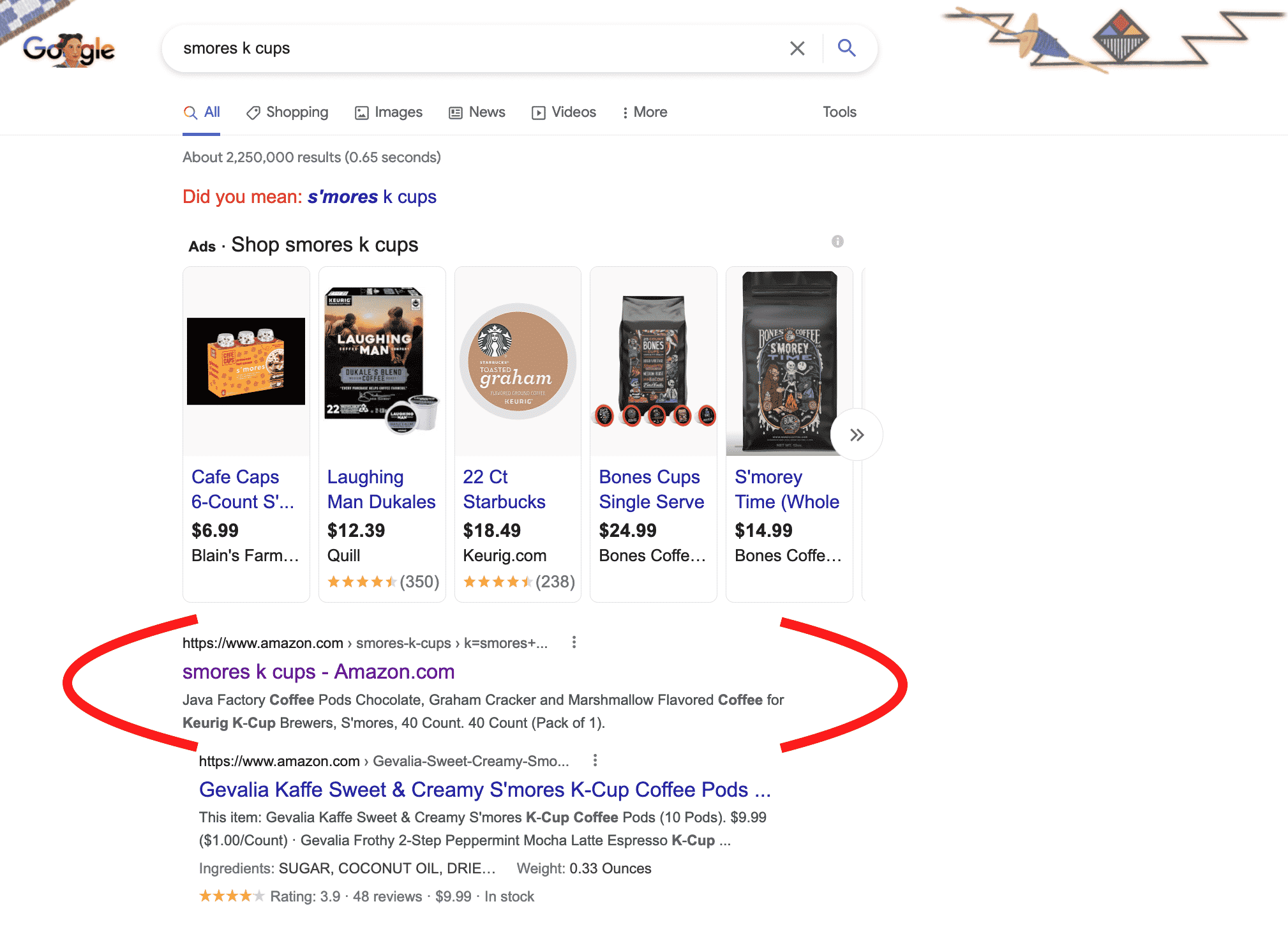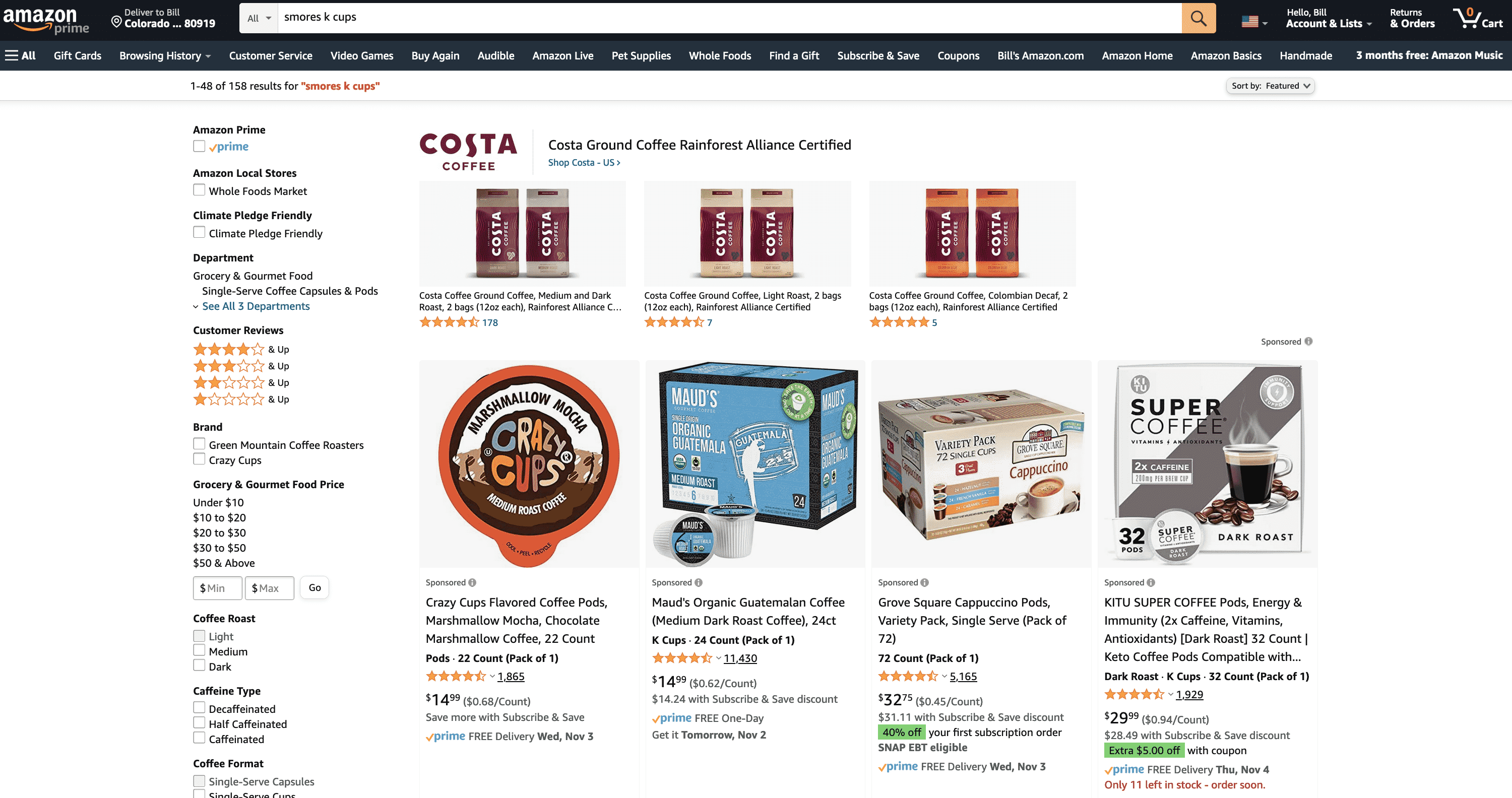
Amazon’s internal search results pages are showing up in Google’s search engine results pages. Some are ranking well for their chosen keyword.
Google is showing, and in many cases, ranking Amazon’s search results in their search results pages. If you search for a keyword in Google, such as ‘smores k cups’, one of the top ranking results in Google’s organic search results is Amazon’s search results page for that same keyword, ‘smores k cups’. This is a big deal for several reasons, but I don’t think it’s acceptable to rank search results pages in the search results pages. It’s just a bad user experience overall.
Search Results in Search Results is Bad for Users
Showing pages of search results in the search results is, essentially a bad user experience. When we search at Google, as a user of that search engine, I am generally looking for information about something. Or, in the case of the name of a certain product or product category, I am looking for that product. The last thing I want to do is click on a search engine result and then see another page of search results. It just adds more clicks. And, personally, if I was looking to buy something on Amazon, I would go directly to Amazon and search for it. I don’t need to go to Google, search for something, and then have to essentially search AGAIN at Amazon.
The Amazon Search Results in Google’s Results
In the case of Amazon’s search engine results showing up in Google’s search engine results right now (as I write this), we can see exactly that this is, in fact, search results pages from Amazon that are “ranking” in Google’s search engine results.
If you look at the URL that is indexed in Google, it looks like this:
https://www.amazon.com/smores-k-cups/s?k=smores+k+cups
The “smores-k-cups” is a category (a sub category actually) of another category page on Amazon. The “s?k=” part of the URL is the search function (k stands for keyword), and you can easily see the keyword smores+k+cups in the URL. There is absolutely no question in my mind that this is a search result from Amazon, just looking at the URL. But even better, when you click on the result (the page that is ranking in Google for “smores k cups”), you get a page of search results at Amazon, that looks like this:
This search results page at Amazon is apparent since the search function is already populated with the keyword, ‘smores k cups’.
Internal Search Results Pages are Thin Content
It’s been widely known in the search engine optimization and search industry that internal search results pages in websites are regarded at “thin content”. In March 2021, Ron Lieback wrote about thin content on websites in Search Engine Journal:
“Oh, doorway pages. They are a huge problem, and easy to recognize. Google describes these as:
- Having multiple domain names or pages targeted at specific regions or cities that funnel users to one page.
- Pages generated to funnel visitors into the actual usable or relevant portion of your site(s).
- Substantially similar pages that are closer to search results than a clearly defined, browseable hierarchy.”
It’s actually the 2nd and 3rd example there, that Mr. Lieback mentions, that I would like to point out. In fact, the Amazon search results pages, the pages that are currently ranking in Google, are, in fact, pages designed to funnel visitors into the actual usable portion of the site: Amazon is creating these pages so they’re indexable, and so they bring visitors to the actual product pages. These pages are also “substantially similar pages that are closer to search results”. They are, well, search results. Internal search results.
Let’s look at the Google Webmaster Guidelines: https://developers.google.com/search/docs/advanced/guidelines/thin-content
There is that actual page about thin content. Let’s see what they say:
Google will take action against domains that try to rank by just showing scraped or other cookie-cutter pages that don’t add substantial value to users.
Wait, what?!? Google will take action (as in give the domain a manual action penalty) against sites that “try to rank by just showing scraped or other cookie-cutter pages”. I don’t see how internal search results pages, literally millions of those pages, add substantial value to users. After all, users can just go search for that keyword at Amazon. And “try to rank”? Well, it’s not Amazon trying to rank: they’re actually ranking for these keywords.
Will Google actually take action against Amazon because they are getting their internal search engine results pages to rank in Google? I don’t know the answer to that. However, all I can do is point it out: and do my best to make sure that Googlers have a chance to see this.
Google Has Indexed Search Results Pages Before
It’s not like we haven’t dealt with this before. A while back, I wrote about Google indexing Bing’s search results pages in their search results. Once that came to light, and Google found out about it, Google promptly removed those search results from their search results. It happened back in 2019, and before that, it occurred in 2013.
As a searcher, or a user of the Google search engine, do you think that an internal search results page should rank well in the Google search engine results? Regardless of whether this is Amazon or not, what if it is another large retailer? Or even a small retailer? Does that provide a good user experience? I don’t think so.
